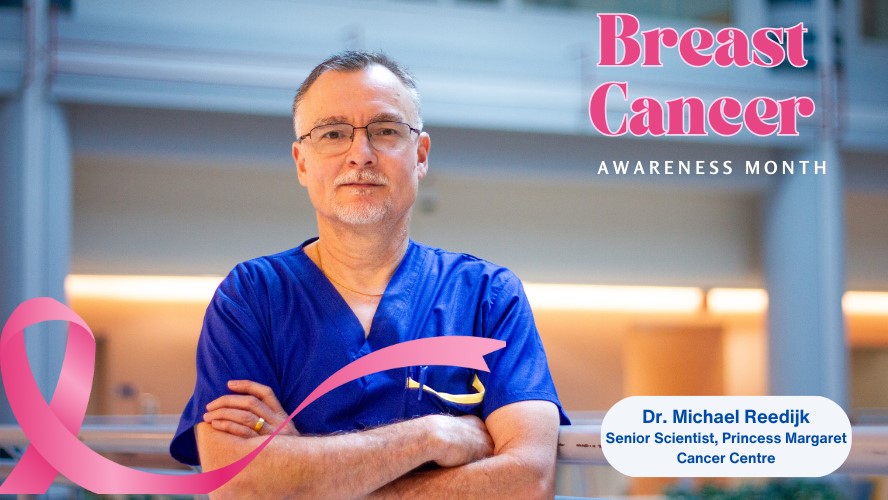
Breast Cancer Awareness Month is an opportunity to highlight both the strides made in research and the ongoing commitment to shape the future of breast cancer treatment and care.
At Princess Margaret Cancer Centre, Senior Scientist and Surgeon, Dr. Michael Reedijk is developing more effective treatments for triple-negative breast cancer (TNBC), a particularly aggressive form of the disease.
Unlike other types of breast cancer, TNBC lacks the receptors that most targeted therapies rely on, making it harder to treat.
“Triple-negative breast cancer accounts for 15-20% of breast cancer cases but has double the mortality rate of the other types, underscoring the tremendous need for targeted therapies.” Says Dr. Reedijk. “There is a great deal of effort going into finding these targeted therapies and that is my lab’s main focus. We aim to uncover drivers and specific characteristics of triple-negative breast cancer.”
One promising avenue of research is immunotherapy, which uses the body's own immune system to attack cancer cells. While this approach has been highly successful in treating some cancers, it has been less effective in TNBC. To improve these outcomes, Dr. Reedijk’s lab is investigating how TNBC interacts with the immune system.
Advancing Breast Cancer Immunotherapy
In a recent study, Dr. Reedijk’s lab identified a potential new therapeutic approach that could enhance the treatment efficacy of immunotherapy for TNBC.
TNBC tumours are often heavily infiltrated by immune cells, a unique trait compared to other types of breast cancers. The presence of specific immune cells can impact patient survival: high levels of tumour-associated macrophages (TAMs) are linked to worse outcomes, while increased cytotoxic T cells (CTLs) are associated with better survival. However, the mechanisms that regulate this are poorly understood.
“Immune checkpoint inhibitors—drugs that prevent cancer from evading the immune system—have shown mixed results for TNBC and this is in part because TAMs can block that immune response against cancer cells,” explains Dr. Reedijk. “We are exploring TAMs as a therapeutic target by investigating the molecular mechanisms underlying how they are regulated.”
Dr. Reedijk’s lab previously found that TNBC tumours produce IL1β, a protein that attracts TAMs and reduces CTLs, promoting cancer growth. His team, including first authors Dr. Weiyue Zheng, a Scientific Associate in Dr. Reedjik’s lab and Dr. Wanda Marini, a medical resident at the University of Toronto, sought to investigate this further.
Using pre-clinical models, they found that a protein involved in producing IL1β, called caspase-1, is specifically increased in TNBC and that blocking this protein reduces TAM levels and increases the tumour’s response to immunotherapy.
This study uncovers a key mechanism behind TNCB’s response to immunotherapy and offers a promising target for future treatments. These findings are being explored in patients with TNBC in a phase 1 clinical trial set to open in November, 2024.
To learn more about Dr. Reedijk’s work, see the video below.
Dr. Reedijk’s lab has recently published additional work on improving immunotherapy in TNBC through regulation of the Notch signaling pathway—a key developmental pathway that is abnormal in TNBC. To read about this research, click here.
This work was supported by the Canadian Cancer Society, the Canadian Institute of Health Research, the Ontario Ministry of Health and Long-Term Care, The Princess Margaret Cancer Foundation and funding from S. Qureshi and family.
Dr. Michael Reedijk is an Associate Professor of Surgery at the University of Toronto.
Zheng W, Marini W, Murakami K, Sotov V, Butler M, Gorrini C, Ohashi PS, Reedijk M. Caspase-1-dependent spatiality in triple-negative breast cancer and response to immunotherapy. Nat Commun. 2024 Oct 1;15(1):8514. doi: 10.1038/s41467-024-52553-6.

